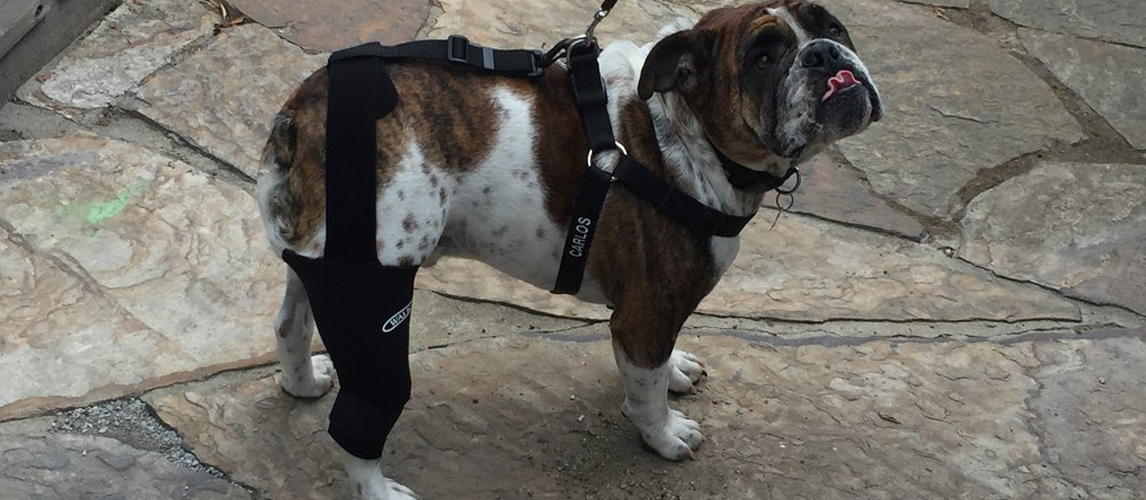While analgesic and anti-inflammatory medications remain a mainstay in the management of pain among dogs, the various side effects and adverse reactions inherent in these pharmaceutical products have prompted many dog owners to look for safer yet equally effective alternatives to the alleviation of pain. For those in the West, it is but natural to look to the East. The traditional Chinese medicine of acupuncture provides the best possible solution to pain and a host of other conditions. But, should you trust your dog to a practitioner who uses only needles and some other gadgets that are not really backed by empirical science?

What is Canine Acupuncture?
Acupuncture for dogs is exactly what it sounds like. It is the use of one of the most ancient methods of treating a variety of human health conditions, albeit applied in dogs. It involves the use of highly specialized needles that are inserted into certain parts of the body of the dog that correspond to specific meridians. It is based on the belief that health and wellbeing is a reflection of the balance of the life force known as ‘chi’ or ‘qi’.
It is believed that this ‘qi’ is continuously flowing throughout the body, following specific paths that join various body organs with other related body parts. Problems occur when this flow of ‘qi’ is disrupted such that surplus ‘qi’ energy is found on one side of the blockage while a deficiency in ‘qi’ energy is found on the other side. The function of acupuncture is to release the blockage so that the energy freely flows and re-establish balance between both sides of the blockage.
Most modern doctors don’t believe in acupuncture. However, some medical practitioners do recommend acupuncture to their patients despite the obvious lack of empirical evidence showing the irrefutable usefulness of acupuncture in the management of a variety of symptoms.
In the animal kingdom, the reception is quite different. There are more veterinarians who are more willing to accept the use of non-traditional veterinary practices such as acupuncture, nutraceuticals, and even other alternative and complementary healthcare practices. In fact, there is an international organization of veterinarians who specialize in acupuncture in animals – the International Veterinary Acupuncture Society – further suggesting its growing importance in the veterinary care of modern-day pets.
Does Acupuncture for Dogs Really Work?
While there is a growing number of veterinary professionals who are including acupuncture in their arsenal of veterinary treatments, it is not unusual that there are still those who are quite skeptic about the whole deal. It is for this reason that some dog owners are a bit apprehensive, too, whether acupuncture will work for their dogs or not.
The Journal of Veterinary Internal Medicine published a meta-analysis of various scientific literatures that pertains to the use of acupuncture in the management of pain and a variety of conditions in dogs. While the result of the meta-analysis did not confirm or reject the therapeutic effectiveness of acupuncture in dogs, it does note that majority of the evidence currently available is anecdotal at best. What this essentially translates to is the first-hand experiences of both veterinarians and dog owners regarding the effects of acupuncture on their dogs.
One needs to understand the difference between empirical evidence and anecdotal evidence. In empirical studies, different variables are carefully eliminated if not controlled to make sure that the observed effects are indeed the result of acupuncture treatment. This gives it a highly authoritative value. On the other hand, anecdotal evidence is purely based on observation. For instance, if you subjected your dog to acupuncture and it did fairly well, then you might say that the treatment worked. Unfortunately, this is more subjective and is, thus prone to a lot of erroneous assumptions. Factors that may affect the outcome are also disregarded. For example, maybe at the time of the acupuncture, it just so happened that the dog was really not in pain at all. But since the timing is ‘perfect’ then it is safe to assume that the dog became well because of the acupuncture.
But, don’t ever think that there is no value in the use of acupuncture for dogs. We don’t think something so ancient as sticking needles through the skin can survive the onslaught of modern medical miracles if there is no truth value to it. Perhaps, what many in the empirical sciences still cannot accept from the principles of acupuncture is the use of the concepts of ‘qi’ and ‘life force’. These are definitely not quantifiable. And if something is beyond quantification, there really is no way one can objectively measure it.
Come to think of it, there are certain aspects of modern medicine that are somewhat similar in principle to acupuncture. Take dry needling, for example. The method is uncannily the same. It involves the sticking of very thin sterile pins through the skin following certain regions of the body in an effort to stimulate specific nerves defined by the body’s dematomes. These are regions that are supplied by a spinal nerve. Technically, it is almost the same with acupuncture except that they don’t use ‘qi’ or ‘life force’. Instead, they use dermatomes, spinal nerves, and nerve impulses. As such, the value of acupuncture as a treatment modality can be validated, albeit indirectly.
Members of IVAS have a more scientific explanation for acupuncture in pets that doesn’t really talk about ‘qi’ or ‘life forces’. Our dog’s body is composed of 365 key acupuncture points. When needles are inserted through these specific points, nerve impulses are generated that connect to the brain where endorphins are released. It is through the action of naturally occurring endorphins that acupuncture for dogs exerts its fundamental mechanisms of action that includes control of pain, dilate blood vessels, and increase the delivery of oxygen and various nutrients to the different tissues, especially the muscles and around joints.
So, will acupuncture work on your dog? If you believe in the empirical sciences, then acupuncture is definitely not for your dog. But if you believe in the experiences of other dog owners as well as the recommendations of other veterinarians, then there really is no harm in trying acupuncture on your dog.
Besides, the American Association of Feline Practitioners and the American Animal Hospital Association will not issue a joint statement recommending the use of acupuncture as a compelling and safe method to manage pain in pets and that veterinarians and pet owners alike should strongly consider the use of acupuncture as an important part in the overall management of pain in pets if they do not believe in its therapeutic benefits. If two respectable organizations have jointly expressed their agreement to the use of acupuncture in pets, then who are we to argue?

What are the Benefits of Acupuncture for Dogs?
There may not be enough empirical evidence to support the therapeutic claims of acupuncture when used on dogs, but a review of current literature will show that it does provide numerous benefits. The following are just some of them.
- Alleviates pain
Veterinary acupuncture has been shown to substantially increase the synthesis and secretion of naturally-occurring endorphins from the brain. These substances are well-regarded for producing a sense of wellbeing in humans. As such, it is believed that these also have the same effects on dogs. Endorphins are opioids that produced naturally by the brain. Their effects are a lot similar to narcotic analgesics like morphine and codeine sans the psychotropic effects and the respiratory depression that is often seen in these kinds of painkillers. This makes acupuncture a highly valued treatment regimen for the management of pain. It is as effective as synthetic opiates but doesn’t come with the harmful side effects and adverse reactions.
- Boosts the immune system
While it is not exactly known how acupuncture can help boost the immune system of dogs, it have been observed that dogs that are treated with acupuncture showed mobilization of immune system cells, particularly white blood cells. This can have significant implications in the way dogs ward off infections and other physiologic instances where a fully functioning immune system can provide tremendous benefits.
It is believed that the resulting improvement in blood circulation can help facilitate the more efficient replenishment of white blood cells as well as other immune system cells that are found in the blood. Improving blood supply means more oxygen and more nutrients. Since immune system cells are largely dependent on proteins owing to the fact that they are composed of globulins, then an improvement in nutrient delivery can help the immune system synthesize the various products needed for defense.
- Helps reduce inflammation
In traditional Chinese medicine, acupuncture is primarily indicated in the management of people with allergies and asthma, reducing the amount of inflammation that accompanies such conditions. While science has yet to uncover in more scientific ways the actual mechanism of action how acupuncture can reduce inflammation, it is believed that this is related to the work of endorphins. Since endorphins also stimulate the walls of blood vessels to dilate, this allows for the more efficient distribution of nutrients and oxygen.
What is often overlooked in such a mechanism is that an improvement in blood flow also helps facilitate the mobilization of anti-inflammatory substances in the body. Veterinarians are not exactly sure how this works, but with numerous dogs with allergies showing progress in their allergic manifestations after only several treatment sessions with acupuncture, it would be safe to assume that the observed reduction in inflammation can be attributed to acupuncture. Besides, one cannot really blame the placebo effect working on dogs.
- Promotes muscle relaxation
The prevailing theory is that when the correct nerves are stimulated, electrical signals are sent to the brain to command the affected muscles to relax. Again, this is often associated with the release of endorphin neurotransmitters. The general idea that endorphins can produce feelings of wellbeing is regarded as an indication of the neurotransmitter’s role in the management of stress. Since stress can be manifested in a variety of ways, including tightening of the muscles, its resolution should, thus lead to unknotting and relaxing of muscle tissues.
The direct penetration of the needle through muscle tissue can also help break up the fascial adhesions that may have developed because of muscle dysfunction. Repetitive strain and muscle disuse are often the causes of fascial adhesions. Knowing where to insert the needle can solve the problem.
Lastly, improving tissue oxygenation and nutrition can help facilitate tissue repair and healing. When muscle tissues are injured, they grow tenser in an attempt to limit the tissue injury. That is why muscles feel knotted or contracted. By improving nutrient delivery, critical building blocks are delivered to the site of injury and help in the repair and regeneration of the injured tissue. This promotes muscle relaxation.
- Improves tissue oxygenation
Oxygen is almost synonymous to life. Without it, cells will simply starve to death. With cells gone, it’s only a matter of time before the organism itself, including man and dogs, dies, too. If you have noticed in our first few benefits of acupuncture, an improvement in tissue oxygenation is always included. From the management of pain to the boosting of the immune system and to the relaxation of muscles, oxygen is a common denominator. It is actually self-explanatory. Without oxygen, your dog dies. Acupuncture simply helps improve the delivery of this very vital gas to the different cells of your dog’s body.
- Will not affect or interact with current medications or supplements
Ever wonder why your vet strongly advices you against giving your dog another painkiller if it is already taking one? For example, if your dog is already taking deracoxib it should not be given another painkiller like carprofen or even aspirin as drug interactions can occur. As such, if your dog’s pain is severe, you’re left with just a single type of painkiller. Or, your dog will be given a more powerful painkiller. Unfortunately, the more powerful it is the more severe are the side effects or adverse reactions. Thankfully with acupuncture, there are no drug interactions whatsoever. So you get the benefit of the painkilling effects of both an analgesic and acupuncture. It won’t also interfere with supplements that your dog may be taking.
- Doesn’t produce adverse reactions
As we already mentioned, acupuncture is safe. It doesn’t produce any of those nasty side effects that dogs can get from medications. Perhaps the only side effect that your pet will have is a slightly uncomfortable sensation as the needle is inserted through its skin. And here’s the thing. Even before the session is over the needles will usually be dislodged on their own and your dog will be feeling more relaxed. In many cases, dogs have been known to fall asleep right after treatment.
What Canine Conditions Can Acupuncture Be Useful?
Given that acupuncture can provide a host of benefits, you’d naturally want to know what conditions in dogs it can be used in. Here are some of the canine diseases and health conditions that veterinary acupuncture has been shown to be effective in.
- Arthritis
- Cancer
- Degenerative disease of the joints
- Metabolic disease such as pancreatitis, Cushing’s disease, hypothyroidism, Addison’s disease, kidney failure, liver failure, and diabetes mellitus
- Trauma including surgery, animal fights, falls, and car accidents
Are There Variations of Acupuncture Used in Dogs?
Acupuncture is the insertion of needles into specific points in the dog’s body through its skin. Now, there are several variations of the technique in case you don’t like the idea of having needles being inserted through your pet’s skin or you would like to try something different but still operates under the same principle.
- Acupressure
This involves the application of pressure over the same acupuncture points. It doesn’t involve any needle insertion and as such is preferred for dogs that are behaviorally-challenging to treat or even for areas that are quite difficult to reach through regular acupuncture.
- Aquapuncture
This is the same as needle acupuncture except that fluid is inserted through the use of a needle. The fluid can be homeopathic solutions, polysulfated glycosaminoglycans, or even diluted vitamin B12.
- Electrostimulation
This technique is preferred for the management of muscle spasms by delivering precisely measured electric currents into the dog’s body through the needles in acupuncture points. It is also used in reestablishing the patency of nerve impulse conduction in cases such as ruptured intervertebral disc, nerve root damage, or injury to the spinal cord.
- Laser stimulation
Think of acupuncture without the needles, only laser energy penetrating through the same acupuncture points. This is a great alternative for dogs that may not tolerate needle insertions in regular acupuncture.
- Moxibustion
In moxibustion, acupuncture needles are applied with heated Chinese herbal compounds before insertion. The combination of heat and herbal remedies has been shown to be effective in relieving muscle soreness or even stiffness of the joints.
Not everyone consider acupuncture to be a mainstay of veterinary care. However, one cannot really dismiss the fact that its ability to stimulate the release of naturally-occurring endorphins, boost the immune system, relax muscles, and improve tissue oxygenation and nutrition are beneficial in the management of various pet disorders. Plus, the fact that it is safe and that it doesn’t interfere with other treatments makes acupuncture for dogs worth trying.
Sources:
- Megan Whelan, DVM, The Use of Acupuncture in Critical Care Units, The MSPCA–Angell
- Lynn Buzhardt, DVM, Acupuncture/Acupressure for Dogs, VCA










